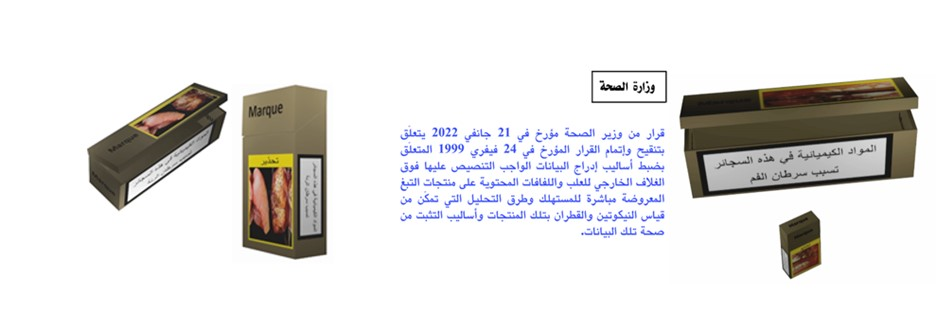WHO support to Tunisia advances tobacco control efforts
In Tunisia, tobacco weighs heavily on the health of its people and the health of its economy. The prevalence of tobacco consumption is 25% and is particularly high amongst the male population (50%) as per the latest Tunisian Health Examination Survey 2016 [1].
According to a recent Tunisian investment case study, every year, tobacco use kills more than 13 200 people, representing 20% of the overall number of deaths in Tunisia, with 49% of these deaths among individuals under age 70. It is estimated that 18% of lives lost from tobacco use are due to exposure to secondhand smoke. In 2019, the economic losses linked to tobacco use in Tunisia were considerable, estimated at 2 billion Tunisian dinar (1.9 billion Tunisian dinar in lost productivity and 146 million Tunisian dinar in health spending), which is equivalent to 1.8% of Tunisia’s gross domestic product. WHO provides support to assist countries in their tobacco control efforts to achieve national targets. WHO’s cooperation with the Government of Tunisia led to an order from the Minister of Heath which mandates that graphic warning labels cover 70% of the outer packaging of tobacco products and must contain written health messages and warnings describing the harmful effects of smoking.
How did Tunisia do it, and how did WHO support Tunisia?
As part of the WHO Framework Convention for Tobacco Control (FCTC) 2030 project, WHO and WHO FCTC provided guidance and support to Tunisia’s tobacco prevention and control efforts. Several actions have been undertaken, in particular the creation of a committed multisectoral network to review the global law, a decree banning smoking in public spaces and the ministerial order to adopt graphic health warnings, elaboration of a protocol for the design and evaluation of graphic health warning labels specific to tobacco products, and dissemination of the investment model for tobacco control as part of a large advocacy campaign.

Photo Credit: © WHO
Photo Caption: Illustrated health warning on cigarette packages in Tunisia.
With over 15 years of FCTC investment in Tunisia, positive returns on investment have been seen. For every 1 Tunisian dinar invested in providing tobacco cessation support, a return of 3 Tunisian dinar has been generated. For every 1 Tunisian dinar invested in increasing taxes on tobacco, a return of 500 Tunisian dinar has been generated. An anti-tobacco investment case study in Tunisia, which WHO and WHO-FCTC contributed to, demonstrated that graphic health warning labels, which warn people of the hazards of tobacco use, are among the three highest returns on investments with 163 Tunisian dinar generated for every 1 Tunisian dinar invested.
A 1998 Tunisian law mandated that cigarette packages must contain a clear, legible warning covering 30% of the principal display area. The law required the composition of tobacco products, including nicotine and tar contents, to be displayed on the packaging in Arabic and in another language. However, the law did not mandate graphic warnings (only requiring one textual health warning) nor was there a requirement to rotate health warnings, which minimizes wear-out effects of the warnings. A key achievement of the cooperation between WHO and Tunisia is an order from the Minister of Heath, published on 15 February 2022, which mandates that graphic warning labels cover 70% of the outer packaging of tobacco products and must contain written health messages and warnings describing the harmful effects of smoking. Health messages and warnings must be written in Arabic and in another foreign language. WHO and the WHO FCTC Secretariat jointly supported the Ministry of Health to issue the order and to develop graphic health warnings for display on tobacco products. Further actions, supported by WHO and WHO FCTC, are being undertaken to prevent smoking in Tunisia, including advocacy for multisectoral commitment to tobacco control.
Today, it is possible to act even more effectively and sustainably. The investment case study illustrates that it is possible to reduce the burden of tobacco in Tunisia. Through implementation of the anti-tobacco measures of the FCTC, Tunisia is estimated to avoid 25% of the economic losses that would be caused by smoking over the next 15 years. Preventing tobacco-related deaths would represent the equivalent of roughly 22% of the reduction in premature mortality required for Tunisia to reach Sustainable Development Goal target 3.4, to reduce by one-third pre-mature mortality from noncommunicable diseases through prevention and treatment, and promote mental health and wellbeing by 2030, and above all save the lives of an estimated 55 000 people.
REFERENCE
[1] http://www.santetunisie.rns.tn/images/thes-rapport2020.pdf
